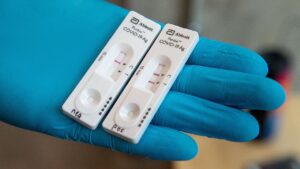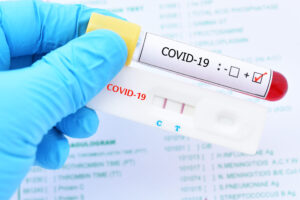
Testing is critical in the battle against the enormous COVID-19 outbreak that has swept the world. Immunodiagnostic Systems (IDS) is pleased to provide you with a comprehensive range of COVID-19 rapid antigen tests that are dependable and of high quality.
- Distribute
- Request further information
Which test should I use and when should I use it?
It is important to have reliable diagnostic rapid antigen tests that can distinguish between individuals who are actively infected by the virus and those who have mounted an immune response against the virus. However, it is critical to understand which rapid antigen tests are most appropriate to apply based on the purpose for which they are meant.
There are two main forms of COVID-19 testing available: a test for current infection (diagnostic test) and a test for recent or prior infection (antibody test), which is also known as a recent or previous infection test.
Diagnostic Test for the Present Infection
It is necessary to do a diagnostic test in order to determine the existence of the virus; consequently, it is symptomatic of an active infection. This sort of test is often performed using a nose or throat swab to evaluate the patient’s health. The molecular and antigen methods are among the technologies used in diagnostic rapid antigen tests.
Genetic material from the virus is detected by molecular testing, often known as RT-PCR (Reverse transcription-polymerase chain reaction) assays. The majority of molecular testing is carried out in a laboratory environment.
Antigen tests look for particular proteins produced by the virus and identify them. When doing an antigen test, you may choose between using an automated laboratory instrument or performing a quick test that does not need any laboratory equipment, making the latter option ideal for usage in any situation.
Antibody Test for Infections that have occurred recently or previously
An antibody test is used to determine whether or not a person has been recently or previously infected with a virus. This test is often conducted by the use of a blood sample.
In order to determine the efficiency of vaccinations and medicines, it is necessary to determine if a person has recently or previously been infected with SARS-CoV-2, as well as the amount of antibodies in their bloodstream.
The Use of IDS Systems for Antigen Testing II
A current infection is detected by detecting SARS-CoV-2 antigens, which are viral surface proteins that elicit an immunological response from the patient.
Antigen tests involve the evaluation of a nasal or throat swab. These rapid antigen tests can be performed in a clinical laboratory on specific equipment that typically provides results in hours, or they can be performed using a simple, rapid test format that typically requires no laboratory equipment and provides results in 15 minutes or less (assay dependent).
Rapid SARS-CoV-2 antigen testing is a simple yet effective approach for identifying persons who are currently infected with the virus and enabling the deployment of contact tracing procedures to assist prevent the spread of the illness. Click here to learn more about contact tracing procedures.
These rapid antigen tests are easy to use, needing no specialized training or equipment to conduct, allowing them to be used in any situation, including close proximity to patients, the workplace, schools, and other institutions.
With the use of a direct nasopharyngeal (NP) swab, IDS provides the following rapid antigen tests to identify the presence of SARS-CoV-2 Nucleocapsid protein antigen in the blood. These easy-to-use antigen tests provide results in as little as 15 minutes and do not need any special laboratory equipment.
- Cassette (Swab) for Coronavirus Ag Rapid Testingii
- Kit for the Rapid Detection of SARS-CoV-2 Antigenii
Integrated Diagnostics Solutions for Antibody Testing
Specific IgM antibody levels are frequently elevated three to five days following the beginning of symptoms in response to viral infections, with the peak occurring three to five days later. The existence of these antibodies is usually detectable for thirty to sixty days after the injection. IgG levels normally become increased after ten to fourteen days and might stay detectable for many years after that time period has passed.
Because each individual’s seroconversion process is unique, it is critical to distinguish between IgG and IgM antibodies separately. The IgM and IgG rapid antigen tests may be used in conjunction to detect antibodies in both symptomatic and asymptomatic people.
It is possible to identify the presence of antibodies (IgG and IgM) against SARS-CoV-2 utilizing serum, plasma, or whole blood using the fast antigen assays offered by International Diagnostic Systems (IDS). This easy-to-use antibody test provides results in as little as 15 minutes and does not need the use of expensive laboratory equipment.
TGS Velox Ab COVID-19 IgM/IgG POCTii is a monoclonal antibody against COVID-19.
The following antibody rapid antigen tests are available from IDS for use in a laboratory setting:
IDS SARS-CoV-2 IgG is a qualitative detection of IgG antibodies to SARS-CoV-2 in human serum and plasma using the IDS-iSYS Multi-Disciplinary Automated System. It is a completely automated qualitative detection of IgG antibodies to SARS-CoV-2 in human serum and plasma. Only for usage in situations requiring an Emergency Use Authorization (EUA).
A completely automated QUANTITATIVE chemiluminescent test for the detection of persons who have developed an adaptive immune response to SARS-CoV-2, suggesting recent or past infection, is available from TGS COVID-19 IgGii.
In the event that effective SARS-CoV-2 vaccines become available, the presence of antibodies will be an essential sign of a person’s immunological response to the virus. As a result, the levels of anti-SARS-CoV-2 antibody response may be useful in determining the efficiency of vaccinations and therapy.
It is possible to identify antibodies that arise early in the course of an infection using the TGS COVID-19 IgMii test, which is a completely automated chemiluminescent assay.
The automated IgG and IgM rapid antigen tests on the IDS system may be performed in conjunction with one another to offer the most accurate picture of the patient’s immune response. When the IgM and IgG values are combined, there is 95.8 percent agreement between positive samples and RT-PCR after 7 days of diagnosis, and 98.6 percent agreement between supposed negative samples after 7 days of diagnosis.
Open automated ELISA systems are compatible with the ErbaLisa® COVID-19 IgGii and ErbaLisa® COVID-19 IgM ELISAii testing solutions for the COVID-19 antigen.

